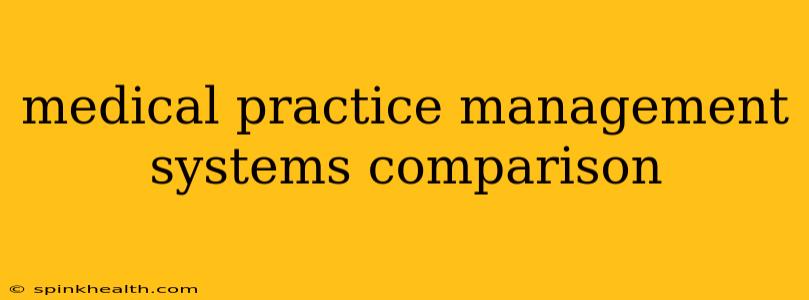Choosing the right medical practice management system (PMS) is crucial for the smooth operation and financial health of any healthcare practice. It's a decision that shouldn't be taken lightly, as the wrong system can lead to wasted time, frustrated staff, and ultimately, impact patient care. This isn't just about scheduling appointments; it's about managing the entire lifecycle of patient interaction, from initial contact to billing and beyond. My journey through comparing various systems has been enlightening, and I want to share my insights with you.
Imagine this: You're a busy physician, juggling patient appointments, managing staff, and navigating complex billing procedures. Suddenly, your current system crashes, leaving you scrambling to reschedule appointments and potentially losing valuable revenue. This scenario highlights the critical importance of selecting a robust, reliable, and feature-rich PMS.
This comparison won't focus on specific vendor names (to remain unbiased and avoid the appearance of endorsement), but rather on the key features and functionalities you should consider when evaluating different options. Think of this as a roadmap to guide your decision-making process.
Key Features to Compare in Medical Practice Management Systems
Choosing the best PMS hinges on understanding your practice's unique needs and priorities. This isn't a "one size fits all" situation. Let's dive into some essential features to consider:
1. Scheduling and Appointment Management:
This is the cornerstone of any PMS. Look for systems that offer:
- Online scheduling: Allows patients to book appointments directly, reducing phone calls and administrative burden.
- Automated reminders: Reduces missed appointments and improves patient engagement.
- Integrated calendar: Provides a clear overview of appointments, minimizing scheduling conflicts.
- Flexible scheduling options: Accommodates different appointment types and durations.
2. Electronic Health Records (EHR) Integration:
Seamless integration with your EHR is essential for efficient workflow and data accuracy. Consider:
- Interoperability: Ensures smooth data exchange between your PMS and EHR.
- Data security: Protects sensitive patient information in compliance with HIPAA regulations.
- Clinical documentation tools: Simplifies the process of recording patient information and progress notes.
3. Billing and Claims Management:
Efficient billing is critical for the financial stability of your practice. Ask about:
- Automated claims submission: Reduces manual work and speeds up payment processing.
- Payment processing: Supports various payment methods for patient convenience.
- Reporting and analytics: Provides insights into billing performance and revenue cycles.
- Account receivable management: Helps track outstanding payments and manage collections.
4. Patient Portal:
A patient portal enhances patient engagement and communication. Key features include:
- Appointment scheduling and management: Patients can manage their appointments online.
- Secure messaging: Allows for private communication between patients and providers.
- Bill payment: Patients can pay bills directly through the portal.
- Access to medical records: Patients can view their medical history and test results.
5. Reporting and Analytics:
Data-driven decision-making is crucial for practice success. Look for:
- Customizable reports: Allows you to generate reports tailored to your specific needs.
- Key performance indicators (KPIs): Tracks important metrics such as appointment volume, revenue, and patient satisfaction.
- Financial dashboards: Provides an overview of the practice's financial health.
6. Customer Support and Training:
A responsive and knowledgeable support team is crucial, especially during the initial implementation and ongoing use of the system. Inquire about:
- Availability of support: 24/7 phone, email, and chat support.
- Training resources: Comprehensive training materials, including online tutorials and in-person training sessions.
- Implementation support: Assistance with setting up and configuring the system.
7. Scalability and Flexibility:
Your practice's needs will likely evolve over time. Ensure the PMS can adapt to your growth:
- Ability to handle increasing patient volume: The system should be able to scale to accommodate your growing practice.
- Customization options: The system should be flexible enough to adapt to your unique workflow.
- Integration with other systems: The system should integrate with other healthcare IT systems, such as labs and pharmacies.
Choosing the right medical practice management system is a journey, not a sprint. Take your time, carefully consider your practice's needs, and don't hesitate to request demos and talk to other healthcare providers who have used the systems you are considering. The right PMS can significantly streamline your operations, improve patient care, and ultimately contribute to the success of your practice.

